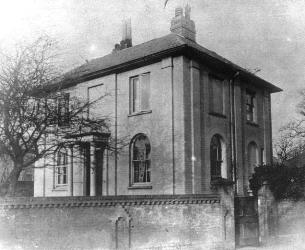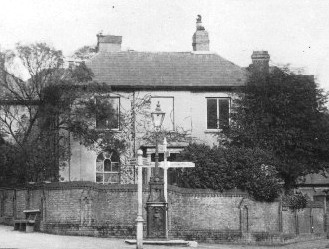
|
Nellie Alice May Hart Autobiography Part 3 |

|

|
Nellie Alice May Hart Autobiography Part 3 |

|

|
Granny had told me that three maiden ladies living at Drum Druid, Parkstone Road needed a young girl for housework. It was a large house with eighteen rooms and a basement. (It is still there only now it is a bank.) The owners were Miss Katie White, Miss Maria and Miss Margaret. When they asked if I could make a bed and light a fire I replied, Granny said that I can learn. The sisters wore long dresses and capes and elastic sided boots. I thought they must be at least a 100 years old.
|

|
Every morning there were five fires to clean and light, dragging the coal up from the cellars for each fire, then I had to prepare the breakfast table and serve breakfast.
After having my own breakfast I had to make the beds, carry cans of water to each room, clean down all of the washstands, fill jugs and empty all pails.
Miss Katie used to do all of the cooking while Margaret filled and cleaned all of the oil lamps each day - fourteen of them, leaving Maria to do all of the shopping, ironing and mending. Later I found out that she also got up very early every morning and emptied a lot of round tin traps in the basement which I found out were filled with cockcroaches. She used to tip them into a bucket of boiling water. I used to wonder what the funny smell was every morning.
To cut a long story short, I stayed at Drum Druid for eight years, even during the war when nearly every girl and every woman in Poole went to work at Holton Heath as they were able to get more money working on munitions.
I shall never forget all those heavy trays of food which I had to carry up three flights of stairs from the basement. I was allowed one half day off in a week and Sunday afternoon and evening. Sunday evening I was expected to go to church at St. James as the Misses Whites attended there and always checked to see if I was there also.
That was where I met Ada Inglis who seemed to be very sad and shy person. She told me that she had to look after her Mum who was an invalid in a wheelchair. Later she invited me to visit her Mum. They lived in Hatch Pond Road, Waterloo, Poole. She was a very nice person who was in a great deal of pain all the time. I felt sorry for her and for Ada.
Ada's Father, Tom Inglis used to be the head game keeper for Lord Wimborne for twenty years. They all used to live in the lodge at Canford Drive and every time a carriage appeared Ada had to go out and open the gates of the drive and close them behind the carriage. There was trouble if the carriage was kept waiting for more than two minutes. When Lord Wimborne gave up Tom Inglis moved to Hatch Pond Road and went to work at the Poole Park aviary for Poole Corporation.
When the war broke out Ada's brother George came back from Canada and his sister Rose where they had lived for several years. There was another brother who remained in Canada for the rest of his life. That was how I came to meet George and years later after the war was over we married.
George went through a very bad time in France. He was manning a gun when it was blown up and only two of the nine crew survived. During that time the weather was some of the worse we had ever had and hundreds of our men were frozen in the trenches full of mud and were just buried there.
George went to a hospital in London then he transferred to Cornelia and others for the next two years. However, much against everyone's wishes, we were married on September 11th 1921 at Longfleet Church by special licence on a Sunday morning. Ada was my bridesmaid and we all went back to Shah Cottage for breakfast. I was 22 years old and George was 28.
George went to work on the bowling green in Poole Park and we found two rooms at the Caxtons, Wimborne Road, opposite the Tatnam Hotel. We stayed there for a year then took a flat at Upper Parkstone up over the bank at Albert Road. After several months there we came back to Lester Road where later on Norman was born. Afterwards we took rooms in St Margarets Road then finally we bought 52, Emerson Road, where for fourteen years I had to have lodgers in all of the rooms to pay off the mortgage. I promised myself then that as long as I lived that I would never take in another lodger and I have kept that promise. I was so sick of a full house and never being able to go on holiday like everyone else.
During this time, four years after Norman was born, Betty arrived. She seemed to sleep all of the time and I had to keep waking her up to feed her. What with feeding all of the lodgers, doing their washing, shopping and taking Norman to school, life was pretty hectic. This was the time that I wished that my Mum had lived and that I had a sister as I was very much on my own. However the day arrived when the mortgage was at last paid off. So, up went a "FOR SALE" board and Mr. Lambden, who had a sweet and tobacco shop in Bournemouth, bought it.
Later my brother Percy married Mr. Lambden's sister, Mary. So off we went again, this time to a house in Palmerston Road, Upper Parkstone which we rented for a year but it was too expensive so we left and went to live in Florence Road where the trains screamed past all night. Luckily you could rent a house quite easily in any road in those days.
During this time the Poole Council built a lodge in Alexandra Park and we went to live there as George had left Poole Park to work as the bowling green keeper at Alexandra Park. So off we went again. During the first six months we all went through hell. It was winter time and the walls of the lodge were running with water and we could not get any heat in the house. All we had was smoke - it came into the room instead of going up the chimney. For weeks I was going to the Council, complaining but they did not believe me.
One day when I was trying to convince them once more, I was so upset because Betty and Norman were ill in bed, the walls were still damp and the water was running down the staircase, that I nearly fainted. Not until then did they do anything.
They called a car and took me home and then started their investigations. It transpired that the workmen dropped six bricks down the chimney when building as a grudge against the foreman. Everything was thrown into chaos and the chimney had to be taken down. All this time we were all freezing cold with no heat at all. Several Council officials and workmen had to go on the carpet and nearly lost their jobs. The Borough Engineer, Mr. Goodacre asked if he could visit me. When he arrived he had brought his wife with him, no doubt he was afraid to come alone.
Back to Part 2 |
Forward to Part 4 |
Back to life story |
Please follow link to make contact with me and help with information